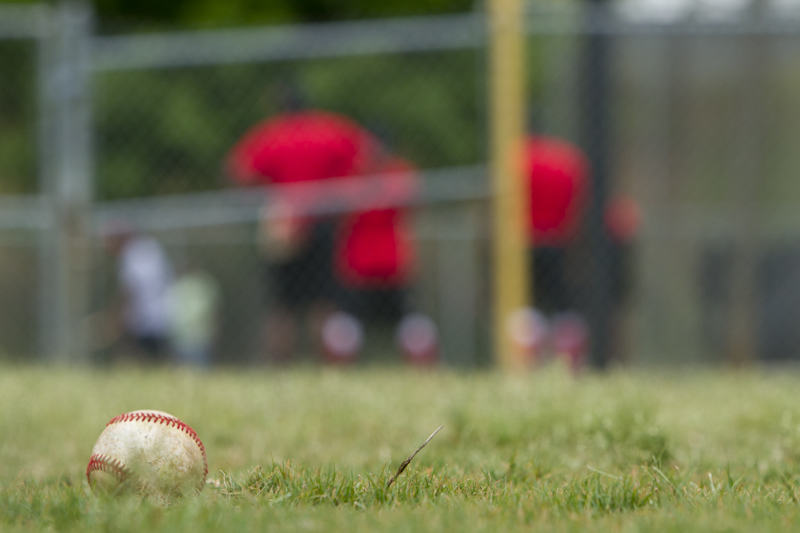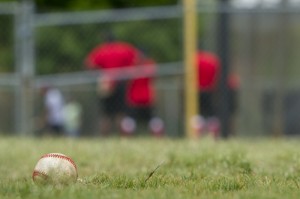 By this time next year, Mendez Elder figures to be on a baseball scholarship at Georgia Tech, Clemson or Rice – the first person in his immediate family to go to college. The catcher is a top prospect in Georgia and was the only inner-city baseball player ever selected for June’s Perfect Game National Showcase in Fort Myers, Fla.
By this time next year, Mendez Elder figures to be on a baseball scholarship at Georgia Tech, Clemson or Rice – the first person in his immediate family to go to college. The catcher is a top prospect in Georgia and was the only inner-city baseball player ever selected for June’s Perfect Game National Showcase in Fort Myers, Fla.
On a recent warm, sunny Saturday morning, Mendez was at Perkerson Park on the south side of Atlanta, helping middle school kids work on their game. Mendez is a catcher with a rocket for an arm. But what he has to offer, any middle school player, regardless of position, would lap up. To them, he’s a bit of a local hero.
Mendez, a rising senior with a 3.3 GPA at Grady High in downtown Atlanta, is a leader on the baseball field and in the community, a coach’s dream, a mother’s answered prayer.
Not too long ago though, he was the polar opposite.
“I never smoke or drank,” Mendez said. “I was just bad. I didn’t listen to no one. I stayed out on the streets, was never at home, lying to my mother, getting in fights, skipping school. I was definitely hanging out with the wrong crowd and headed for that life.
“I got hit with a pistol on top of head. I’ve been shot at before at a party, just hanging with wrong people. Getting shot at changed me because I know I have a future. I want to be first in family to go to college. Even now, it brings tears to my eyes. That’s not my character.”
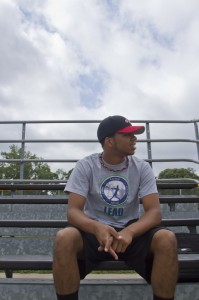
Mendez Elder
That’s about when C.J. Stewart, a professional baseball hitting coach and founder of the L.E.A.D. Ambassadors program, tossed Mendez a lifeline. Come learn from Jason Heyward’s personal hitting instructor, be a part of an elite travel team that will assuredly garner the attention of college scouts, and get outfitted with some of the best equipment Nike has to offer. All it would cost Mendez was his old way of life and his selfish, me-first attitude.
And in that fee, there was no negotiating.
Stewart has spent much of the last four years developing top-notch baseball products out of at-risk inner-city kids through L.E.A.D -- a non-profit group that stands for launch, expose, advise and direct. Players receive year-round baseball training — and much more. Over the years, 87 percent of the Ambassador players have gotten a college scholarship to play baseball. The last couple of years, every graduating senior has gone on to play college ball.
That’s the pedigree Stewart is building upon and offering.
“I don’t, and we don’t, take the mentoring role lightly,” C.J. Stewart said. “Many of these kids see drug activity in their neighborhood every day. We’ve got to give them a chance to say no. We can’t be taking something from their hands without putting something in it. That something is baseball, an education, a chance for a better life”
Mendez first got involved for what the Ambassadors could do for him. Now, he’s as concerned about what he can give back.
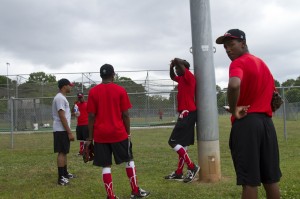
Mendez and teammates catch their breath.
“As a freshman, I as a pretty good player, but I was real cocky,” he said. “If one of my teammates messed up, I was putting him down pretty bad. Now, I don’t care as much about wining as I do building my teammates up and helping them have fun. Everything is different in this environment. The people I’m meeting in my service projects, or board members, I don’t want to mess that up.”
C.J. Stewart had patience with Mendez. But that patience does have its limits.
“Mendez has one of the best arms I’ve seen,” C.J. Stewart said. “He’s in the top 150 high school players in the nation. But when he first joined us, he wasn’t the young man he is now. We’re willing to give a lot of time and opportunities to the kids, but we’re not going to waste a lot of time on a kid who is profane, vocal, who can’t handle failure without exploding.”
One of Mendez’s younger teammates, Cedric Reed, a sophomore at Carver High in the southwest of the city, has heard about Mendez the Enforcer. He just hasn’t seen it. Nor could he really imagine it.
“Mendez coaches me when I miss a grounder,” said the Ambassador’s shortstop of the future. “I haven’t seen that other side of him. If I mess up something, or if someone else does, or if he strikes out, he just brushes it off instead of getting down on himself or his teammates. He’s one of the guys I really look toward as a mentor.”
Cedric and his twin Cornelius are first-year members of the Ambassadors. Cedric is a little reluctant to talk about the potential lifestyle this program was rescuing him from. He’s got two parents that care about him and his brother, and love them, he said.
So he thinks whatever temptation the streets threw his way, he’d have been able to avoid.
In a separate interview, Cornelius scoffed at that.
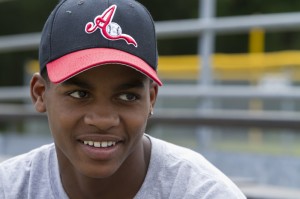 “This has saved me from doing a lot of that stuff,” Cornelius said. “In my community, there’s a lot of drugs, shootings, killings. With L.E.A.D., I come to practice every Saturday instead of being tempted to do bad stuff. It took me out of that mindset.”
“This has saved me from doing a lot of that stuff,” Cornelius said. “In my community, there’s a lot of drugs, shootings, killings. With L.E.A.D., I come to practice every Saturday instead of being tempted to do bad stuff. It took me out of that mindset.”
Like Mendez, Cornelius has seen way too much for a young man of 15.
“I’ve seen people get shot at. I saw a person who’d actually been shot. There are always fights at school, and threats to shoot up the place. Around Coach C.J. and (his wife) Ms. Kelli, I feel safe.”
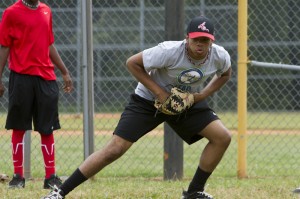
Mendez recovering after fielding a ground ball.
During the summer, the Ambassadors will play travel baseball, competing against some of the premiere teams in the Southeast. Scouts will watch and sponsors will see to it that the kids have the right shoes and uniforms.
Participants chosen for the Ambassadors are indeed given a lot. Stewart’s wife, Kelli, who oversees business operations, said it costs $8,000 for each L.E.A.D. player to be trained, equipped and travel to summer tournaments.
But a lot is also expected from them as well.
The players and their families have to make Atlanta a better place to live. Players must complete a monthly community service project on a Saturday. They also must stay connected to school, keep out of trouble and be mentors to middle-school players.
“We serve young men who aren’t necessarily invested in the city,” C.J. Stewart said. “With the service piece, we want to show these young men you can be a strong part of the community now. They haven’t been introduced to that previously. We measure that with civic stats. If the kid has a high batting average, but low civic stats, he can’t stay in our program, period. And they know that.”
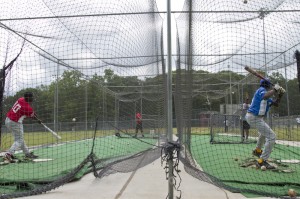
The Ambassadors hit the batting cages during practice.
Lorenzo Woodward, a junior at Carver, appreciates that approach.
“Just to help out around the community and to bring something to the middle school kids, helping them have the chance to play and to be a leader, reminds you that it is not all about you, but about the program,” Lorenzo said.
Desmond Stegall, a graduating senior from Mays High School on the city’s west side, will be playing baseball at Middle Georgia College in the fall. He said setting his mind on leaving one way of life and finding something new has been one of his biggest accomplishments.
“Being with this team, and Coach C.J. and Miss Kelli helped me get my mind set on leaving here, applying for colleges and keeping up with my grades,” Desmond said. “Baseball is second. School is first. It took me a minute, but now I realize that. I’ve got to do certain things in life, and college is one of those things.”
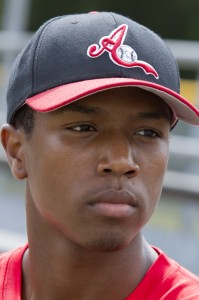 C.J. Stewart loves it when the kids talk about college, about leadership and about service. Those things don’t just roll off of kids’ tongues naturally. And just like turning the perfect double play, it takes a lot of time and practice.
C.J. Stewart loves it when the kids talk about college, about leadership and about service. Those things don’t just roll off of kids’ tongues naturally. And just like turning the perfect double play, it takes a lot of time and practice.
“We don’t sugarcoat things around here,” C.J. Stewart said. “You lose credibility and realness if you do. We deal with kids who come from dangerous, troubled streets. Baseball is a great outlet, and for a lot, a way out. But simply getting out isn’t enough. They need to want to come back, give back and be leaders. This program isn’t set up for it to be me and Kelli forever. We need help. We’re expecting it.”
Photography by Clay Duda, JJIE Staff.
